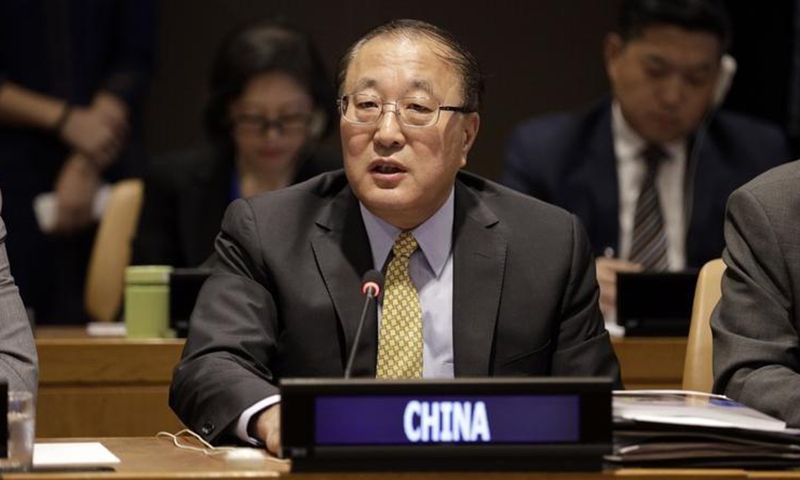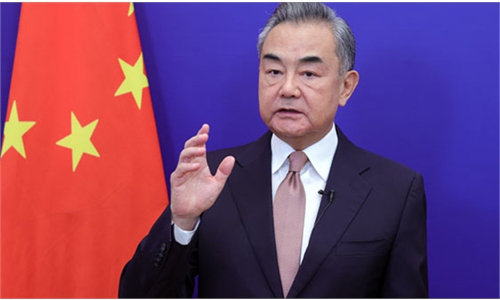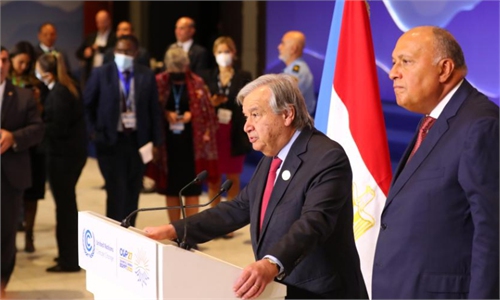Chinese envoy to UN calls on international community to slow down global warming and contain rapid sea-level rise

In this Sept 12, 2019 photo, China's Permanent Representative to the UN Zhang Jun speaks at the UN headquarters in New York.(Photo: Xinhua)
A Chinese envoy called on the international community to take all necessary actions to rigorously slow down global warming and contain the trend of rapid sea-level rises during a United Nations (UN) Security Council debate on Tuesday.
The international community should step up forward-looking studies on the consequences of rising sea levels, and in the meantime, focus on climate change as its root cause, rigorously slow down global warming, and contain the trend of rapid sea-level rises, Zhang Jun, China's permanent representative to the UN, told a Security Council debate on "Sea-level Rise: Implications for International Peace and Security."
According to Zhang, to achieve the temperature cap set in the Paris Agreement, developed countries must take the lead in further reducing emissions. However, since last year, there has been a backtracking of the energy policy of some developed countries and an increase rather than decrease in their fossil fuel consumption and carbon emissions, which makes the already elusive global emissions reduction prospect even more precarious.
Most developed countries set forth their carbon peaking and carbon neutrality targets and programs relatively early and they should set an example by taking concrete actions for their implementation, Zhang said.
Zhang pointed out that financing always lies at the heart of and is a key issue for global climate governance. Developed countries are obliged and responsible for providing climate change financing and assistance to developing countries.
"As early as 2009, developed countries pledged $100 billion annually to developing countries, which has yet to be truly delivered up to date, making their so-called commitment nothing but an empty promise," Zhang said.
Worse still, some countries, while passively responding to the funding needs of developing countries, invests hundreds of billions of dollars in hefty subsidies for domestic manufacturing through the so-called Inflation Reduction Act, purportedly to promote its energy transition, according to Zhang.
"Such hypocritical and self-serving, green protectionism violates WTO rules, discriminates against relevant industries in other countries, and undermines the collective efforts to tackle climate change globally," Zhang said.
Adhering to true multilateralism and strengthening solidarity and cooperation are the only way out in addressing the climate change challenge, Zhang noted.
"We should stick to the principle of common but differentiated responsibilities, which bears on international equity and justice. Deviation from this principle will severely damage the unity and cooperation of the international community to tackle climate change," Zhang said.
Zhang also noted that small island developing states are most exposed to climate shocks, but the least adaptable at the same time. The international community should effectively address the concerns and needs of small island developing states, and help them with capacity building through financial and technical assistance. The marine environment conservation is a common responsibility of humankind.
According to Zhang, a pressing challenge is the discharge of nuclear contaminated water from the Fukushima nuclear power plant, which will seriously damage the marine environment and people's health, with small island developing states and their people bearing the brunt.
China urges Japan to fulfill its international obligations, dispose of the nuclear contaminated water in a science-based, open, transparent and safe manner, and effectively protect the marine environment and ecosystem, Zhang said.
China, as a country with a long coastline, also pays great attention to the risks from rising sea levels. In the face of climate change, China has always been steadfastly action-oriented with no efforts spared once a commitment is made, Zhang said.
China always advocates and engages in South-South Cooperation on climate change. China will continue to work with all parties to actively participate in global climate governance and tackle the climate change challenge, Zhang said.
Global Times



